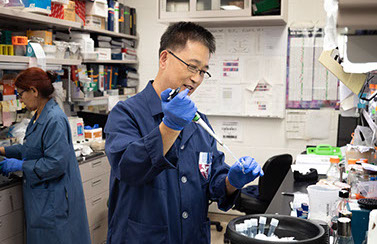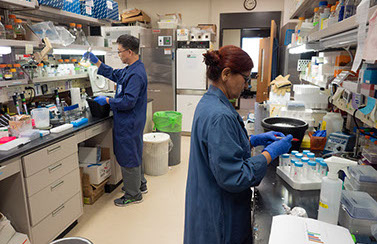THE PROBLEM
The Dunn lab has a longstanding interest in the sphingolipids, a complex family of molecules with crucial structural and signaling roles in all eukaryotic organisms. Perturbations in their synthesis, trafficking, and degradation underlie many human diseases. As bioactive lipids, they participate in a wide variety of biological processes, including cell death and proliferation and dysregulation of their homeostasis is a common feature in cancer as well as a target for chemotherapeutics. The sphingolipids are also critical for proper development and function of the nervous system and one of the focuses of the lab is to understand how mutations that alter sphingolipid synthesis lead to neurodegenerative diseases.
- Current funding support: NHLBI-CMPH/NSF
- Previous funding support: NIGMS/NIH, NINDS/NIH, NSF 2010 Program Project, American Heart Association, USU, BBSRC travel funding
"Sphingolipids play critical roles as membrane constituents and bioactive signaling molecules. Mutations in sphingolipid biosynthetic enzymes cause devastating neurodegenerative diseases. Understanding the biochemical basis of these diseases, with the goal of therapeutic intervention, is a focus of the Dunn lab."
OUR APPROACH
Over the past couple of decades, the Dunn lab has made many seminal discoveries in the sphingolipid field. Using powerful genetic screens and biochemical characterizations in the model eukaryote, Saccharomyces cerevisiae (yeast), we identified many of the enzymes required for the synthesis of this diverse family of lipids. The discovery of the yeast genes paved the way for the identification of the human genes, creating the foundation that has led to the recent association of defects in enzymes of the pathway with numerous human diseases. Most recently, the lab is focused on determining the structure of the committed enzyme of the pathway, serine palmitoyltransferase (SPT). Our goal is to understand how the small activating subunits of SPT (ssSPTs) and negative regulators of SPT (ORMDLs) interact with the core catalytic enzyme to insure proper maintenance of sphingolipid homeostasis. Current studies are focused on the role of ORMDL3 (identified through GWAS studies as a risk factor for asthma) in regulation of SPT and on disease mutations that lead to aberrant SPT activities in neurological disease.
OUR COLLABORATIONS
Our ORMDL/asthma studies are being done in collaboration with Dr. Andrew Snow (Pharmacology) and Dr. Edward Mitre (Microbiology) here at USUHS and with Dr. Rick Proia (NIDDK) and Brian Wattenberg (VCU). Our work on neurological disease is a collaboration with Dr. Carsten Bonnemann (NINDS) and Dr. Claire Le Pichon (NICHD). The structural studies are being done in collaboration with the laboratories of Dr. Dominic Campopiano (University of Edinburgh) and Dr. James Naismith (Oxford University). In addition to the work on yeast and mammalian sphingolipids, the Dunn lab also has a longstanding NSF-funded collaboration with the laboratories of Dr. Edgar Cahoon and Dr. Jonathan Markham at the University of Nebraska, Lincoln aimed at understanding the synthesis and functions of sphingolipids in plants.


